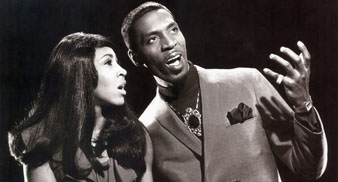Put aside, for one moment if you can, the wife-beating and accusations of mental cruelty, the 11 million dollars he claimed to have blown on cocaine and the time in jail. Ike Turner's undeniable claim to a key role in rock'n'roll history is a quite separate issue from whether or not he was a nice man. Born the son of a Baptist minister in Mississippi when the Delta was still a land of itinerant, roaming bluesmen, the dynamic pop-soul records he made with Tina Turner, capped by the monumental "River Deep Mountain High", would be more than enough to cement his place in any hall of fame. Yet even before he met his future wife, he'd already secured his place in history when he cut "Rocket 88" in Memphis in 1951 with his band the Kings Of Rhythm. The track was officially credited to singer Jackie Brenston, but it was Turner's creation - it's widely cited as the world's first rock'n'roll record. It also made Turner a prime mover on the Memphis scene and he went on to produce and/or play on records by, strong>Junior Parker, Howlin' Wolf, BB King and Bobby "Blue" Bland among others, many of them for Sun Records. By 1956 he'd moved to St Louis where the following year he met the 17-year-old Anna Mae Bullock. The world soon came to know her as Tina Turner and she featured on a string of great late '50s/early-'60s R&B hits with Ike that are among the funkiest sides either of them ever recorded. They were soon overshadowed, though by '66's "River Deep Mountain High", a landmark pop recording on which Ike's role was minimal but which was probably Phil Spector's finest hour. Back in sole charge of his wife's career, a support slot on the Rolling Stones' '69 tour led Ike to create a new sound geared to appeal to white rock audiences. It produced such hits as "Proud Mary" and "Nutbush City Limits" but in '76, after one beating too many, Tina walked out on him and the full extent of his brutality towards her was revealed. Without her, his career and life went on the skids, and when Tina was inducted into the Rock'n'Roll Hall of Fame in '91, there was no Ike: he was in jail at the time. His reputation suffered further from Laurence Fishburne's vicious portrayal of him in the '93 Tina Turner biopic, What's Love Got To Do With It. In recent years he made strenuous efforts to rehabilitate his reputation, and when he won a Grammy in 2007 for best traditional blues album for "Risin' With The Blues", he felt that he was finally being recognised for his contribution to musical history after years of being ignored and denied as a result of distaste over his personal life. Pic credit: Redferns
Put aside, for one moment if you can, the wife-beating and accusations of mental cruelty, the 11 million dollars he claimed to have blown on cocaine and the time in jail. Ike Turner‘s undeniable claim to a key role in rock’n’roll history is a quite separate issue from whether or not he was a nice man.
Born the son of a Baptist minister in Mississippi when the Delta was still a land of itinerant, roaming bluesmen, the dynamic pop-soul records he made with Tina Turner, capped by the monumental “River Deep Mountain High”, would be more than enough to cement his place in any hall of fame.
Yet even before he met his future wife, he’d already secured his place in history when he cut “Rocket 88” in Memphis in 1951 with his band the Kings Of Rhythm. The track was officially credited to singer Jackie Brenston, but it was Turner’s creation – it’s widely cited as the world’s first rock’n’roll record. It also made Turner a prime mover on the Memphis scene and he went on to produce and/or play on records by, strong>Junior Parker, Howlin’ Wolf, BB King and Bobby “Blue” Bland among others, many of them for Sun Records.
By 1956 he’d moved to St Louis where the following year he met the 17-year-old Anna Mae Bullock. The world soon came to know her as Tina Turner and she featured on a string of great late ’50s/early-’60s R&B hits with Ike that are among the funkiest sides either of them ever recorded. They were soon overshadowed, though by ’66’s “River Deep Mountain High”, a landmark pop recording on which Ike’s role was minimal but which was probably Phil Spector‘s finest hour.
Back in sole charge of his wife’s career, a support slot on the Rolling Stones‘ ’69 tour led Ike to create a new sound geared to appeal to white rock audiences. It produced such hits as “Proud Mary” and “Nutbush City Limits” but in ’76, after one beating too many, Tina walked out on him and the full extent of his brutality towards her was revealed.
Without her, his career and life went on the skids, and when Tina was inducted into the Rock’n’Roll Hall of Fame in ’91, there was no Ike: he was in jail at the time. His reputation suffered further from Laurence Fishburne‘s vicious portrayal of him in the ’93 Tina Turner biopic, What’s Love Got To Do With It.
In recent years he made strenuous efforts to rehabilitate his reputation, and when he won a Grammy in 2007 for best traditional blues album for “Risin’ With The Blues”, he felt that he was finally being recognised for his contribution to musical history after years of being ignored and denied as a result of distaste over his personal life.
Pic credit: Redferns



